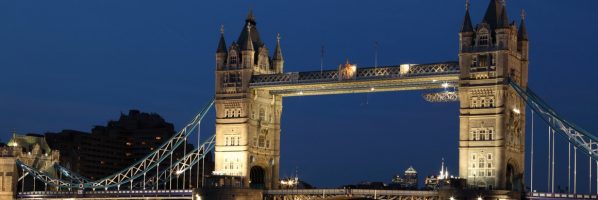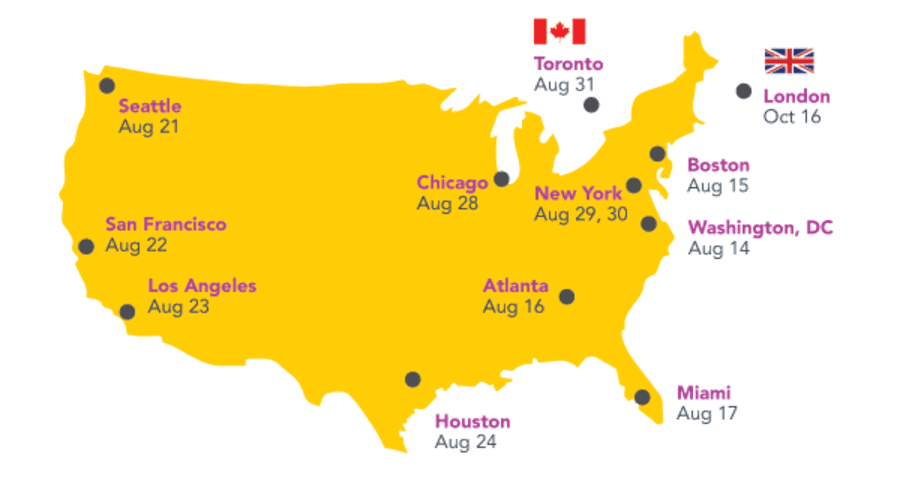Amazon Talks About Its Success and Recruiting at London Business School

It’s not that surprising to hear about Seattle-based Amazon recruiting from top U.S. MBA programs such as the University of Michigan’s Ross School of Business, where it was the number-one recruiter in 2016, hiring 31 of the school’s MBA grads. What might be more surprising is the fact that Amazon is also a big recruiter at London Business School (LBS), where it snapped up 13 Class of 2016 MBA graduates, right behind BCG, McKinsey, and Bain. When speaking to students and alumni at an LBS event, Doug Gurr, Amazon’s U.K. country manager, said, “The U.K. is an amazing location to recruit great talent, and LBS is somewhere we find the talent we need.”
Currently, the United Kingdom is a prime location for Amazon, with more than 24,000 employees and 373,000 U.K. businesses as part of its marketplace, web, and publications services. This makes recruiting in the United Kingdom easily fit into Amazon’s founding principles, which include customer obsession, passion for invention, commitment to operational excellence, and long-term thinking. As Gurr admitted, “The biggest constraint on our growth is finding the right leaders to join us,” and LBS is known for producing quality MBA graduates and business leaders.
However, hiring in the United Kingdom isn’t the only key to Amazon’s success. Gurr explained that the company is also focused on unmet customer needs. For example, that’s how the Kindle came about. “The Kindle didn’t exist so we built it,” said Gurr. “We’d never built anything before, but we had passion and conviction about the quality of the idea. That was the genesis of our move into manufacturing hardware devices.”
Other inventions from Amazon include Alexa, its cloud-based voice service, as well as flying autonomous drones, and hundreds of other small improvements. To Gurr, it’s all these small things that make Amazon faster, simpler, and better than its competitors.
The thing to note according to Julian Birkinshaw, a professor of strategy and entrepreneurship at LBS, is that this slow growth can also mean slow profits. “In 2016, you generated US$136 billion (£102 billion) in revenues and a net income of US$2.4 billion (£1.8 billion), which is less than 2 percent,” Birkinshaw said. “That’s small, but that has always been the story.”
But, according to Gurr, that growth trajectory is exactly what the company wants. “We optimize free cash flow over the long term,” he explained. “The simple answer is that we’re willing to make deep, long-term investments—we don’t need an instant payback. We do what’s right for the customer and what’s right for the business.”
To read more about Amazon’s MBA graduate recruiting efforts, read the Financial Times article, “Amazon’s Shopping Spree at Business Schools.”
This article has been edited and republished with permissions from Clear Admit.
Beyond Business School: Meet the Cambridge EMBA Who Is Rebuilding Libya

As an Executive MBA (EMBA) student, you don’t have to choose between your career and your studies, which was exactly the case for Roland Friedrich, who worked as a senior political affairs officer for the United Nations while pursuing his EMBA at Cambridge Judge Business School. Friedrich graduated with his EMBA in 2016, but through his studies he was involved in the rebuilding of Libya as part of the United Nations Support Mission in Libya (UNSMIL). This mission, established in 2011, supports the country’s transitional authorities and institutions after the overthrow of Colonel Gaddafi.
Of his role, Friedrich said in a Cambridge Judge blog: “42 years of authoritarian rule left behind weak institutions, multiple factions, and militias vying for influence and an abundance of weapons. Six years after the 2011 revolution, the country faces a prolonged political, security and—more recently—economic crisis. The challenges range from terrorism and organized crime and deteriorating living conditions to political polarization and fragmenting institutions.”
As for how he got involved in Libya, it started with a career in the German armed forces where he focused on conflict management, security sector reform, and Middle Eastern affairs. From there, Friedrich spent eight years at the Geneva Centre for the Democratic Control of Armed Forces as a security sector reform advisor. After that, he joined the UN to work directly with Libya.
Over the course of his work, Friedrich has been involved in some incredible initiatives, including ceasefire negotiations between the ‘Libya Dawn’ and ‘Dignity’ militias, negotiating the Libyan Political Agreement, and advising the Special Representative of the UN Secretary-General for Libya on the mission’s policies in the region.

Friedrich (EMBA ’16) pictured third from left. Image via Cambridge Judge website.
“[This work] requires a thorough understanding of the local players and their motivations, a clear vision of what you want to achieve, and lots of creativity and flexibility when facilitating a deal,” he wrote. “There are quite some shared aspects here with strategy development and negotiations in the business world.”
And it was these “shared aspects” that made an EMBA at Cambridge Judge such a good idea. In his work, particularly dealing with the balance of power between nations, Friedrich found that understanding the latest management approaches was a great way to enhance his work in mediation and strategy.
“Cooperation between the UN and the private sector is picking up sharply, not only in the humanitarian and development fields but also in peace and security,” Friedrich explained. “The EMBA helps me get on top of the latest management concepts and practices. It also helps me develop a thorough understanding of strategic management and organizational behavior—issues that have always fascinated me and that are of direct relevance to my work.”
For a full account Roland Friedrich’s experience as a UN officer and EMBA student, check out the blog on the school website.
This article has been edited and republished with permissions from Clear Admit.
The Highest Paid MBA Starting Salaries in London

The draws of London may be too numerous to list: from a booming global economy to robust historic and cultural attractions, the city has a little something for everyone.
It’s likely no surprise that the city would take the sixth spot in The Atlantic‘s list of the “World’s Best Cities for Business, Life and Innovation.” While a number of factors were taken into consideration for creating the list, London’s ranking was likely boosted by its top spot in financial/business employment, and its 2nd overall spot in attracting job-creating foreign investment.
Such attributes make London an ideal spot for those pursuing or graduating with MBA degrees. As a center for global business, the opportunities for someone with the skills of an MBA are seemingly endless. However, the same vibrancy that attracts visitors across the world to London can make it an incredibly expensive city to live in from day-to-day, and those considering a move will need to consider both the cost of the city as well as earning potential.
Thankfully, London is home to some of the top MBA programs in the world, boosting the hireability and earning potential of graduates.
The Highest Paid London MBA Salaries
Saïd Business School – University of Oxford
Students at the Saïd Business School at the world-renowned University of Oxford take their education to countries around the world and into a wide variety of industries. Even considering the uncertainty brought to businesses in UK with the ‘Brexit’ referendum, the salaries of Oxford MBA graduates continue to rise from from the previous class to 2016 graduates. The average class salary for recent MBA grads at Saïd was £69,132, or $93,404 US—an increase of almost $13,000 from the previous year. These salaries varied slightly with industry, with salary averages for fields like finance and consulting reaching $96,273 and $98,458, respectively.
London Business School
With a staggering 96 percent of MBA graduates from London Business School accepting an offer within just three months of graduation, LBS graduates don’t need to wait long to start their dream job, with hopefully a salary to match. For MBA graduates of LBS, the average salary could range between £32,000 and £151,000, with the mean coming at an impressive £77,600. Salaries varied slightly between industries and also by region, with LBS graduates staying in the UK making slightly less than those venturing to North America.
READ MORE: “London Business School Launches More Flexible MBA”
Judge Business School—University of Cambridge
Graduates from the University of Cambridge Judge Business School will quickly realize the benefits of having such a well-regarded degree: about 92 percent of students from the graduating class received job offers within three months of earning their degree. The Cambridge MBA data also reveals the degree’s success in aiding those as they transition to a new career—98 percent of the 2015 graduating class switched either country, function, or industry sector just two years after graduating. The typical salary of Judge graduates increased greatly for the MBA class of 2015—likely a result of fluctuations in the pound after the Brexit decision—at a current average of £99,000, or, $133,792 USD.
Cass Business School—City University London
The Cass Business School at the City University London ranks among the top three schools for career development in the UK, a ranking reflected in the data of MBA graduates from the University. About 87 percent of MBA graduates reported a 53 percent increase in their salary. The average salary for MBA graduates at Cass is $99,000, with an even greater increase for those with an Executive MBA degree, at $130,000.
Which Cambridge Judge Scholarships Are Right For You?

Money can be a compounding stressor when it comes to earning an MBA. Sure, the degree is worth it, but achieving it requires serious planning. With books, housing, and a social life, the bills add up. Luckily, most universities and business schools offer scholarships to make it easier for students to attend.
Take London’s Cambridge Judge Business School, for example. The Financial Times ranked the business school’s MBA program as the fifth best in the world in 2017, and the best overall in the UK. To help join one of the world’s preeminent business institutions, a number of scholarships are available. Some focus on academic achievement, but others are about equity and go toward students of a specific nationality or gender. The institution recognizes that this type of financial assistance is necessary—after all, one year of tuition costs £49,000 (nearly $64,000 USD). That, of course, doesn’t include books or meals.
Those interested in applying for these Cambridge Judge scholarships must do so before the school year officially begins.
The Boustany Foundation Scholarship: The Boustany Foundation Scholarship offers £23,000 in financial assistance, as well as any travel costs. The scholarship is granted once every two years with priority given to Lebanese nationals. However, an applicant must be “outstanding and highly meriting.”
The Culture, Arts and Media Bursary: This scholarship looks at candidates interested in working in media, which can include fields such as journalism, creative writing, or production. The offer caps at £10,000. Once the scholarship is offered, applicants are expected to compete through an essay and give a talk on the media to the class.
The Ruth Whaley Bursary for Women in Science: This is a scholarship specifically for women working in finance. The Ruth Whaley Bursary gives a candidate £10,000—as well as the opportunity to mentor with Ruth Whaley, the founder of New York-based risk management consulting firm Barset Consulting LLC. The goal? That more women take up senior finance positions.
The EY Scholarship for Angolan Residents: This is the only scholarship that covers the business school’s full-tuition. That includes college fees, living expenses, and a flight back home to Angola. Applicants for the EY Scholarship are required to write an essay on how they’d use their time at Cambridge to further sustainable development to Angola.
The Sainsbury Bursary Scheme: Despite what the name suggests, this scholarship is no scheme. It recognizes applicants who have worked in the charity and volunteer sectors, offering them £14,000-28,000. They must show how they’d use their skills to continue this work. UK citizens working in the UK are given priority.
The Maissa Karim Scholarship: This £2,500 award is in honor of the lake Maissa Karim, a member of the school’s 2005 program. Now, that might not sound like much, but the money goes to a candidate who wouldn’t be able to do the MBA program without financial assistance. Every dollar counts.
The St. Catherine’s Benavitch Scholarship: This generous gift offers five candidates £10,000 each. Named after the late Maurice and Natalie Benavitch, the scholarship is supposed to develop tomorrow’s business leaders. Those who receive the award will join St Catherine’s College, a five-minute walk from Cambridge Judge. That means that five lucky candidates will have access to not one, but two university campuses.
2017 Forté Forums Scheduled in 12 Cities Beginning August 14

It’s August, which means it’s almost time for the Forté Forums. These free events are hosted by the Forté Foundation, a nonprofit consortium of leading companies and top business schools committed to advancing the role of women in business. Scheduled for 10 U.S. cities as well as Toronto and London beginning on August 14, they are designed to help women learn more about the value of the MBA.
Whether you are a college student looking to explore options for the future, have been in your job for a few years and are thinking about a change, or are looking for a way to catapult yourself to the next level in your career, the Forté Forums are for you.
Choose to attend a forum in a city near you, and you can learn more about how the MBA can help you advance in your career, expand your earning potential, or provide opportunities to study abroad. With more than 100 leading business schools in attendance, you can also learn more about different programs directly from the school representatives who know them best.

The Forté Forums also draw leading MBA businesswomen from a range of industries and career stages, eager to share their experiences and provide advice and guidance. And they give you a chance to network with other high-achieving women interested in learning more about the MBA. Former attendees of the Forté Forums report that women they’ve met at the events have become part of a lasting peer support network.
Last but not least, the forums can help you begin to think about how to finance your MBA, offering valuable information about Forté’s scholarship opportunities, as well as many other funding sources.
Whether you know nothing at all about business school and want to see what it’s all about—or you’re planning to apply this fall and want to connect with others doing the same, don’t miss out. Register for a nearby Forté Forum today!
2017 Forté Forums Calendar:
August 14th: Washington, DC
August 15th: Boston
August 16th: Atlanta
August 17th: Miami
August 21st: Seattle
August 22nd: San Francisco
August 23rd: Los Angeles
August 24th: Houston
August 28th: Chicago
August 29th and 30th: New York City
August 31st: Toronto
October 16th: London
Learn more about the Forté Forums, including how to register.
This article has been edited and republished with permissions from Clear Admit.
Your Guide To London’s Executive MBA Programs

Even after many years on-the-job learning, many business professionals may choose to pursue a formal advanced business education. With the chance to earn an Executive MBA, experienced professionals can pursue a degree more tailored to their particular experience level and career goals. EMBA graduates may find other benefits as well, including a 11.6 percent salary increase after graduation. Other tangible benefits can be seen in the form of career growth and increased leadership opportunities, development of a global business mindset and the establishment of a strong peer network.
